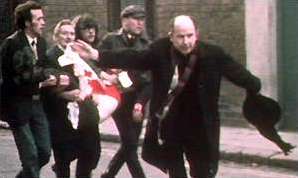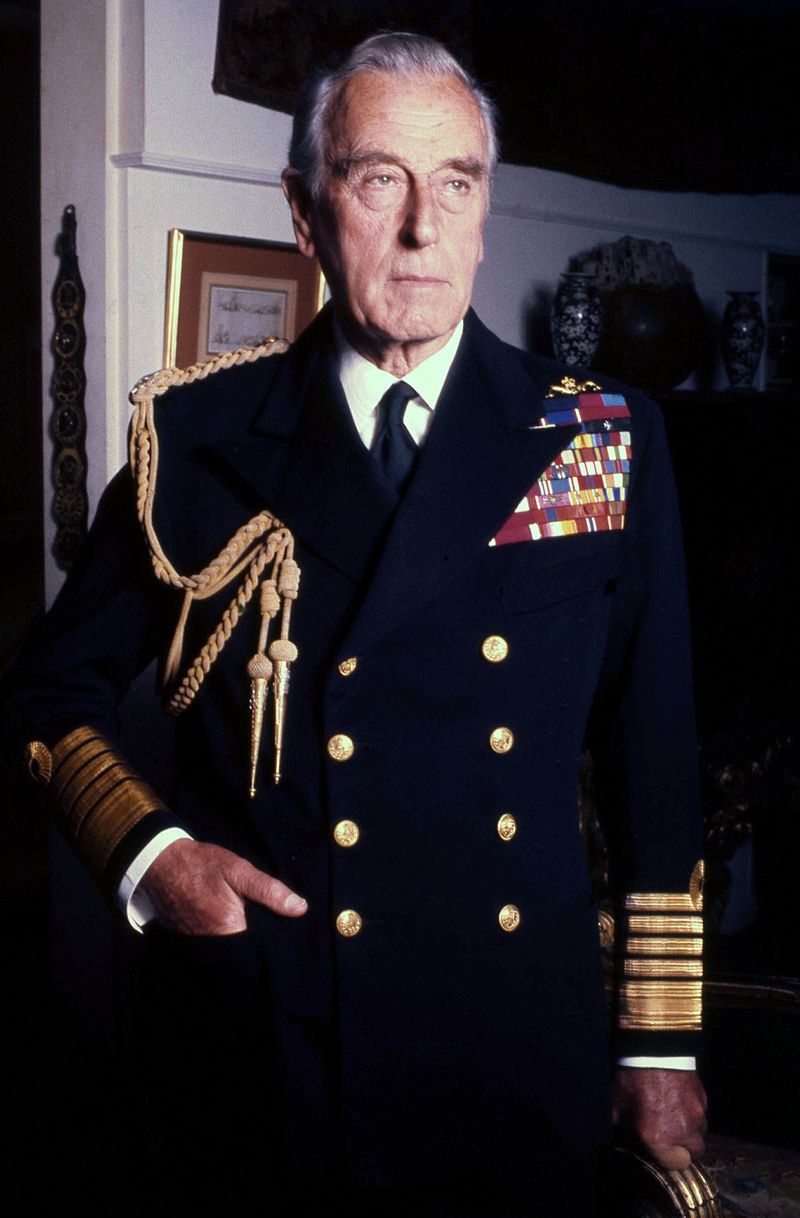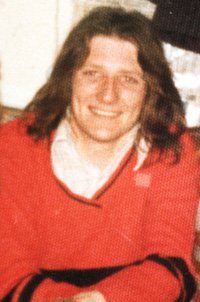
Sands was born into a
Roman Catholic family in Abbots Cross, and lived in Doonbeg Drive,
Newtownabbey,
County Antrim, until 1960 when the family was forced to move to
Rathcoole, Newtownabbey. His first sister, Marcella, was born in April 1955 and second sister,
Bernadette,
in November 1958. His parents, John and Rosaleen, had another son,
John, in 1962. On leaving school, Bobby became an apprentice
coach-builder until he was forced out at gunpoint by loyalists.
In June 1972, at the age of 18, Bobby moved with his family to the
Twinbrook housing estate in west
Belfast, and had to leave Rathcoole due to
loyalist intimidation.
He married Geraldine Noade. His son, Gerard, was born 8 May 1973. Noade soon left to live in England with their son.
Sands' sister, Bernadette Sands McKevitt, is also a prominent
Irish Republican. Along with her husband
Michael McKevitt she helped to form the
32 County Sovereignty Movement and is accused of involvement with the
Real Irish Republican Army. Sands McKevitt is opposed to the
Belfast Agreement,
stating that "Bobby did not die for cross-border bodies with executive
powers. He did not die for nationalists to be equal British citizens
within the Northern Ireland state."
In 1972, Sands joined the Provisional IRA.
He was arrested and charged in October 1972 with possession of four
handguns found in the house where he was staying. Sands was convicted in
April 1973 sentenced to five years' imprisonment and released in April
1976.
Upon his release from prison in 1976, he returned to his family home
in West Belfast, and resumed his active role in the Provisional IRA's
cause. He was charged with involvement in the October 1976 bombing of
the Balmoral Furniture Company in
Dunmurry.
He was never convicted of this charge; the presiding judge stated that
there was no evidence to support the assertion that Sands had taken
part in the bombing. After the bombing, Sands and at least five others
were alleged to have been involved in a gun battle with the
Royal Ulster Constabulary,
although Sands was not convicted due to lack of evidence. Leaving
behind two of their wounded friends, Seamus Martin and Gabriel Corbett,
Sands,
Joe McDonnell,
Seamus Finucane, and Sean Lavery tried to escape in a car, but were
apprehended. Later, one of the revolvers used in the attack was found in
the car in which Sands had been travelling.
In 1977, prosecutors charged him with possession of the revolver from
which bullets were fired at the RUC after the bombing. After his trial
and conviction, Sands was sentenced to 14 years' imprisonment within
HM Prison Maze, also known as Long Kesh.
Immediately after his sentence, Sands was implicated in a ruckus and
spent the first 22 days "on boards" (all furniture was removed from his
cell) in
Crumlin Road Prison, 15 days naked, and a No. 1 starvation diet (bread and water) every 3 days.
In prison, Sands became a writer of both
journalism and
poetry, with work published in the Irish republican newspaper
An Phoblacht. In late 1980 Sands was chosen as
Officer Commanding of the Provisional IRA prisoners in Long Kesh, succeeding
Brendan Hughes who was participating in the
first hunger strike.
Republican prisoners organised a series of protests seeking to regain their previous
Special Category Status which would free them from some ordinary prison regulations. This began with the "
blanket protest"
in 1976, in which the prisoners refused to wear prison uniform and
wore blankets instead. In 1978, after a number of attacks on prisoners
leaving their cells to "
slop out" (i.e., empty their chamber pots), this escalated into the "
dirty protest", wherein prisoners refused to wash and smeared the walls of their cells with excrement.
While in prison Sands had several letters and articles published in the Republican paper
An Phoblacht (en:
Republican News) under the pseudonym "Marcella". Other writings attributed to him are:
Skylark Sing Your Lonely Song and
One Day in My Life. Sands also wrote the lyrics of "Back Home in Derry" and "McIlhatton", which were both later recorded by
Christy Moore; and he wrote "Sad Song For Susan" which was later recorded. The melody of "Back Home in Derry" was borrowed from
Gordon Lightfoot's famous 1976 song "
The Wreck of the Edmund Fitzgerald."
MP
Shortly after the beginning of the strike,
Frank Maguire, the
Independent Republican MP for
Fermanagh and South Tyrone, died suddenly of a heart attack, precipitating the
April 1981 by-election.
The sudden vacancy in a seat with a nationalist majority of about five
thousand was a valuable opportunity for Sands' supporters to unite the
nationalist community behind their campaign. Pressure not to split the vote led other nationalist parties, notably the
Social Democratic and Labour Party, to withdraw, and Sands was nominated on the label "
Anti H-Block
/ Armagh Political Prisoner". After a highly polarised campaign, Sands
narrowly won the seat on 9 April 1981, with 30,493 votes to 29,046 for
the
Ulster Unionist Party candidate
Harry West - and also become the
youngest MP at the time. However Sands died in prison less than a month afterwards, without ever having taken his seat in the Commons.
Following Sands' success, the British Government introduced the
Representation of the People Act 1981
which prevents prisoners serving jail terms of more than one year in
either the UK or the Republic of Ireland from being nominated as
candidates in British elections. This law was introduced in order to
prevent the other hunger strikers from being elected to the British
parliament.
Hunger strike
he
1981 Irish hunger strike
started with Sands refusing food on 1 March 1981. Sands decided that
other prisoners should join the strike at staggered intervals in order
to maximise publicity with prisoners steadily deteriorating successively
over several months. The hunger strike centred on five demands:
- The right not to wear a prison uniform;
- The right not to do prison work;
- The right of free association with other prisoners, and to organise educational and recreational pursuits;
- The right to one visit, one letter and one parcel per week;
- Full restoration of remission lost through the protest.
The significance of the hunger strike was the prisoners' aim of being
declared political prisoners (or prisoners of war) as opposed to
criminals. The
Washington Post reported that the primary aim of the hunger strike was to generate international publicity.
Death
Sands died on 5 May 1981 in Maze prison hospital after 66 days of hunger-striking, aged 27. The original
pathologist's
report recorded the hunger strikers' causes of death as "self-imposed
starvation", later amended to simply "starvation" after protests from
the dead strikers' families. The
coroner recorded verdicts of "starvation, self-imposed".
The announcement of Sands's death prompted several days of rioting in
nationalist areas of
Northern Ireland. A milk deliverer, Eric Guiney, and his son, Desmond, died as a result of injuries sustained when their
milk float crashed after being stoned by rioters in a predominantly nationalist area of north Belfast.
Over 100,000 people lined the route of Sands's funeral and he was
buried in the 'New Republican Plot' alongside 76 others. Their grave is
maintained and cared for by the
National Graves Association, Belfast. Sands was a Member of the Westminster Parliament for 25 days, though he never took his seat or the oath.
In response to a question in the
House of Commons on 5 May 1981, British
Prime Minister Margaret Thatcher
said, "Mr. Sands was a convicted criminal. He chose to take his own
life. It was a choice that his organisation did not allow to many of its
victims".
Sands was survived by his parents, siblings, and his son, Gerard.














